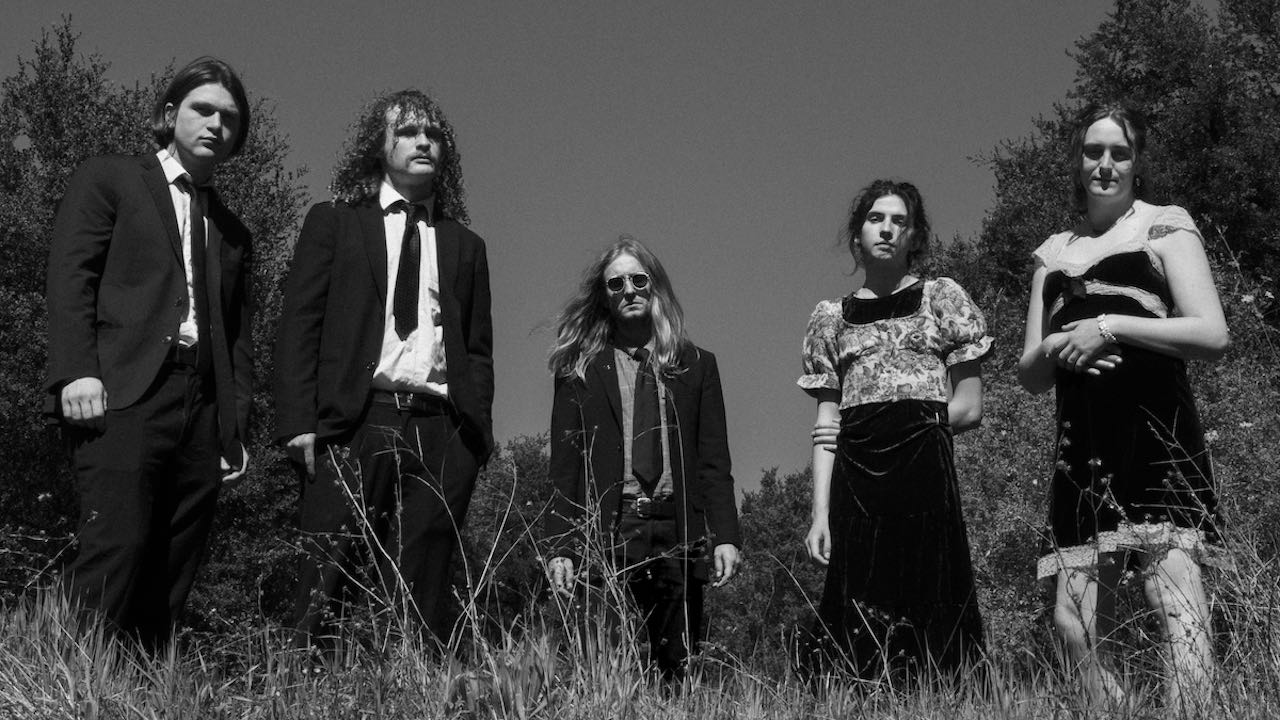We recently caught up with the two tentpoles of Shearling, Alexander Kent and Sylvie Simmons, about the rad new experimental-rock band they formed from the ashes of Sprain and under the influence of Michael Gira’s ever-evolving Swans project. They spoke to us from a small studio in a wood cabin in the hills of Los Angeles, not long after they put the finishing touches on the project’s just-released debut, the sprawling Motherfucker, I am Both: “Amen” and “Hallelujah”...
Kent and Simmons had their hands full making the record, even though they also tapped three additional musicians for support: bassist Wes Nelson, drummer Andrew “Hayes” Chanover, and vocalist Rachel Kennedy. Kent—who handled guitars, vocals and keyboards for Sprain—also took on production and engineering duties, in addition to playing a litany of other instruments (accordion, banjo, hammered dulcimer, bells, taishogoto). Meanwhile, guitarist Simmons stretched out by additionally contributing synthesizer, organ, Hi-C programming, and samples.
Their brains still rattling from the creation of their monstrous new composition—calling it both a wildly bold and ambitious debut would still be an understatement—Kent and Simmons answered some questions for us with their remaining, combined set of brain cells.
Have you ever met Michael Gira?
Kent: One time I met him after a show he played. I said, “Thanks for playing.” And he said, “You betcha.” Another time I met him after one of his Michael Gira shows with Carla Bozulich—I was 18 or 19, a little more impressionable. I had him sign some of my records, and I was so starstruck that I actually left them at the merch table. I was walking away, and he said, “Hey, you left all these.” Thank god he said that. I would’ve lost my whole collection.
Was there an a-ha moment when you realized you could have Shearling be something bigger than yourselves?
Simmons: The ambition was always there. The question was how soon were we going to be ready, and who were we going to get involved. It was always a question of “when” rather than “if” we were going to make another band.
Kent: As soon as Sprain broke up, that day, we started talking about when we were going to get together and work on the next thing. When Sprain broke up, it was emotional, but neither of us saw it as the end.
Simmons: It wasn’t like we were going to stop collaborating.
Kent: It was just an astronomical bump in the road.
Did you have a specific goal with Shearling?
Kent: It was hard to lose Sprain, but it was freeing, in a way, because there was no clear direction or limitation.
Simmons: And no expectation of what this new band should sound like. There was a “lost” feeling when Sprain ended. At that point, we were both, like, “Fuck it, we need to throw things against the wall.”
Kent: We felt like we didn’t have anything left to lose. There’s freedom, to a degree, in what can come out of that.
Simmons: In terms of who’s playing what instrument, who’s responsible for what part of the song: There were no rules, even if they were [subconsciously] self-imposed.
Kent: As Shearling became more solidified, we wondered about how we were going to sound and how were people going to react to changes and creative decisions we’d made that maybe Sprain wouldn’t have. But before that groundwork was solidified, we were working in a nebulous space, sort of floating, and experimenting a lot. Some of it wasn’t that great!
How do you feel like you complement each other?
Kent: Shearling is not just a duo. The other people aren’t just session musicians; they all contribute creatively. I am a boss, inevitably, because I am that personality type.
Simmons: Which helps. Being in a hyper-democratic band can be incredibly frustrating. It’s more conducive to productivity, and easier sometimes, to have someone who’s pushing a project and can make an executive decision.
Kent: Something we struggled with in Sprain was a lack of clearly defined roles. In Shearling, the vision is shared between Sylvie and me, but it’s actuated by all five of us. My musicianship is pretty stiff.
Simmons: I think he’s harsh on himself about playing an instrument.
Kent: Technique-wise, I guess, I realized what I can’t play.
Simmons: This guy is a more prolific songwriter than anyone I’ve ever met. We have so much material to work on. A lot of the time, songwriting feels like banging your head against a wall. Having four other people there to help pick up the slack when you’re stuck is really helpful with finishing something.
Kent: It’s a big commitment to play in a band like this, to make really intense music with no reward—no money, fame, all the cliched stuff that rock musicians want.
What kind of relationship are you hoping to cultivate between the band and the audience?
Simmons: We’re fantasizing about having a Sun Ra House–style community store that funds our insane records. We don’t want to cultivate a fanbase that veers toward idolatry. But our music does deal with topics that are taboo, and sometimes people who stumble across our music develop a parasocial relationship to it. You attract extreme people if you make extreme music. But, for the most part, it’s not a problem…so far.









